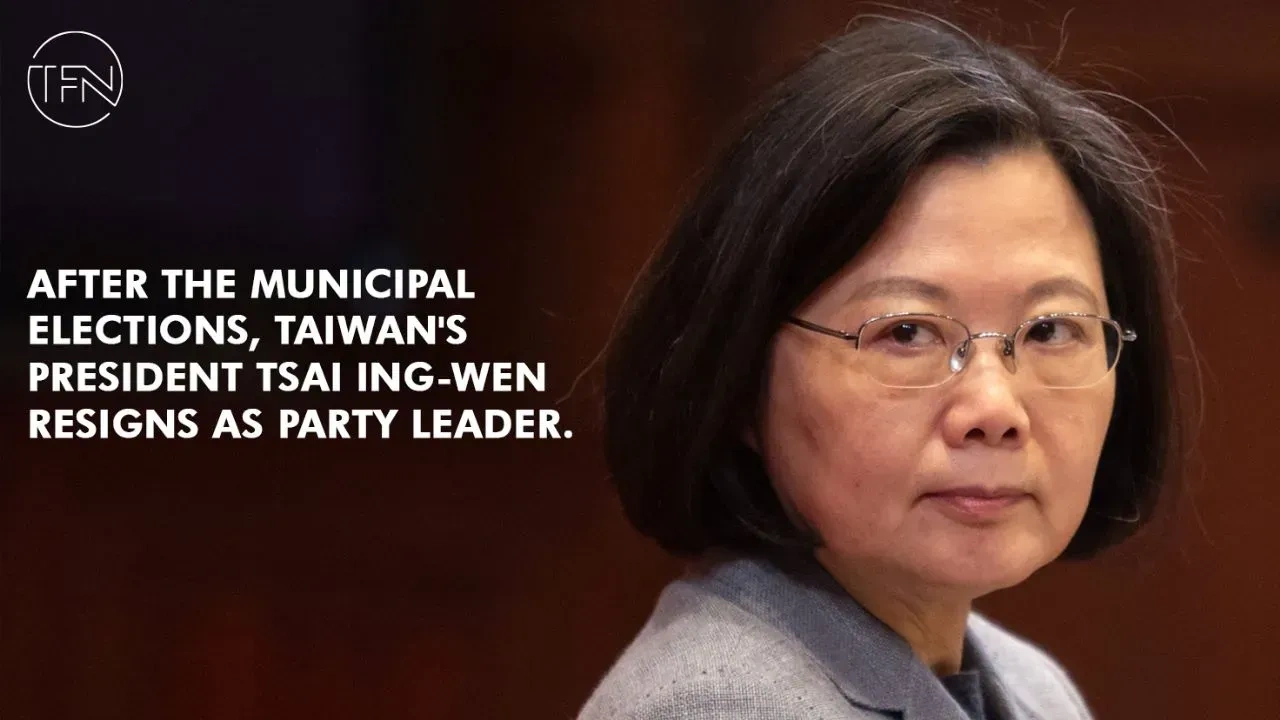
Tsai Ing-wen, the president of Taiwan, has resigned from her position as leader of the Democratic Progressive Party (DPP) after attempting to gain public support. On Saturday night, Tsai gave a brief speech in which she thanked her supporters and, as is traditional after a severe loss, offered her resignation.
She said, "I have to take full responsibility." There are many areas that we must thoroughly analyze when faced with an outcome like this.
The elections for mayors, county executives, and local council members are focused on the COVID-19 outbreak and crime; the winners will not have an immediate impact on Chinese policy.
Tsai, who reframed the election as more than just a local vote, said that the world is watching how Taiwan maintains its democracy despite military tensions with China, which claims the island as its own.
Concerning the 21 city mayor and county chief seats up for election, including the capital Taipei, the main opposition party, the Kuomintang, or KMT, was in the lead or declared victory in 13, compared to the DPP's five, which is roughly in line with expectations and similar to the outcomes of the most recent local elections in 2018.
"The results weren't as good as we had expected,” Tsai announced her resignation as party leader, which she also did in response to 2018's disappointing results, to the media at the party headquarters.
Tsai, who will continue to hold the office of president until 2024, continued, "It's not like the DPP has never failed before. There is no time for sympathy. We stumbled, but we will get back up.”
Tsai stated that she had turned down the premier's offer to resign, Su Tseng-chang, who is also a senior DPP member, and that she had urged him to remain in office so that her policies would be properly carried out.
Su opted to remain, according to the Cabinet, since stability was required in light of the "arduous" domestic and international circumstances.
The Taiwan Affairs Office of China stated that the outcome demonstrated that the majority of Taiwanese citizens supported peace, stability, and "a good life" and that Beijing would continue to collaborate with the people of Taiwan to advance peaceful relations and oppose Taiwan's independence and foreign interference.
"Red" allegations
Both the DPP and KMT focused their electioneering efforts in Taipei, whose mayor was from the small Taiwan People's Party, which could not run again owing to term limits and had historically favored close ties with China but vehemently denied being pro-Beijing.
As a reference to the colors of the Chinese Communist Party, the KMT has accused Tsai and the DPP of engaging in excessive hostility with China and of attempting to discredit the party by calling it "red."
It concentrated its campaign on denouncing the government's reaction to the COVID-19 pandemic, particularly in light of the recent spike in cases.
Eric Chu, the chairman of the KMT, announced their victory and pledged to defend Taiwan's liberties.
He told reporters, using Taiwan's name for itself, "We will insist on safeguarding the Republic of China and maintaining democracy and freedom. We'll work very hard to maintain regional peace."
To show its displeasure with US House Speaker Nancy Pelosi's visit to Taipei, China conducted war games near Taiwan in August. Its military exercises have since continued but on a smaller scale.
The election was held a month after the Communist Party of China's 20th congress, where President Xi Jinping won an unprecedented third term in office, a fact Tsai frequently emphasized during the campaign.
The 2020 presidential and parliamentary elections, which Tsai and the DPP won handily on the promise to oppose China and safeguard Taiwan's freedoms, will now be the center of attention.
Due to term restrictions, Tsai, who is currently serving her second term in office, cannot run for president again.

